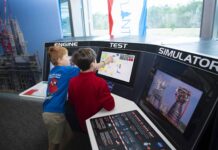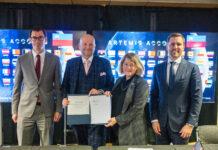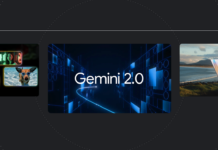NASA has been at the forefront of space exploration for decades, continually pushing the boundaries of what is possible. As part of its ongoing efforts to advance lunar exploration, NASA’s Office of Technology, Policy, and Strategy (OTPS) is organizing an event that promises to be a significant milestone in the journey towards autonomous lunar missions. The Lunar Autonomy Mobility Pathfinder (LAMP) workshop, scheduled for November 12, 2024, will serve as a vital platform for discussions on modeling and simulation in the context of lunar exploration.
Understanding the LAMP Workshop
The LAMP workshop is a collaborative effort organized by NASA’s OTPS and supported by the Space Technology Mission Directorate. Set to take place at the University of Nevada Las Vegas (UNLV) Black Fire Innovation Facility, this event is designed to coincide with the 2024 Lunar Surface Innovation Consortium fall meeting. This alignment ensures that participants can leverage the synergies of both gatherings to maximize their learning and networking opportunities.
The Artemis Campaign: A New Era of Lunar Exploration
The LAMP workshop is intricately linked with NASA’s Artemis campaign, a bold initiative aimed at landing the first woman and the first person of color on the Moon. This campaign is not just about reaching the lunar surface; it’s about doing so in a way that is sustainable and technologically advanced. By utilizing cutting-edge technologies, NASA aims to explore more of the Moon than ever before. A critical component of this mission is the development of trusted autonomy.
What is Trusted Autonomy?
In the context of space exploration, trusted autonomy refers to a sophisticated level of autonomous operations that can be relied upon for extended missions. Unlike traditional autonomy, which may require human intervention at various stages, trusted autonomy is designed to function independently over long periods. This capability is crucial for lunar missions where direct human oversight may not be feasible due to vast distances or communication delays.
Objectives of the LAMP Workshop
The LAMP workshop will provide a comprehensive forum to explore various topics related to lunar autonomy and modeling. Key areas of discussion will include:
- Modeling and Simulation (M&S) Pathfinder: This session will delve into the creation of an integrated simulation environment. The aim is to bring together stakeholders from commercial industries, government agencies, international partners, and academic institutions. By collaborating in this simulated lunar environment, participants can test the interoperability of their systems and prepare them for eventual deployment on the Moon.
- Leveraging Rover Missions: The workshop will explore how upcoming rover missions can be used to refine the modeling and simulation environment. These missions provide real-world data that can help calibrate the simulations, ensuring they are as accurate and reliable as possible. Additionally, rovers can serve as testbeds for developing and maturing autonomous algorithms in a controlled setting.
Participation and Registration
The LAMP workshop is open to both in-person and virtual attendees. Interested individuals must register separately for the event, ensuring they secure their spot in this groundbreaking forum. For those attending in person, the workshop offers a unique opportunity to participate in a live showcase of lunar simulation capabilities at UNLV’s Black Fire Innovation esports arena. It’s important to note that space for this showcase is limited, so early registration is encouraged.
Workshop Agenda
The workshop is structured to provide a comprehensive overview of current challenges and future opportunities in lunar autonomy. The agenda includes:
- Modeling and Simulation Showcase (10:00 a.m. – 12:00 p.m. PST): A chance for participants to demonstrate their capabilities in a competitive and collaborative environment.
- Challenges to Developing Trusted Autonomy (1:00 – 2:00 p.m. PST): A discussion led by NASA experts on the hurdles of creating reliable autonomous systems and strategies to overcome them.
- Pre-Formulation Discussion (2:00 – 3:00 p.m. PST): Subject matter experts will outline the vision for a digital transformation pathfinder to enhance global lunar autonomy efforts.
- Lunar Testbeds Discussion (3:15 – 4:15 p.m. PST): This session focuses on how lunar assets can be used to generate valuable data for Earth-based simulations, ensuring the reliability of autonomous systems.
- Polling and Discussions (4:15 – 5:00 p.m. PST): An interactive session where participants can provide feedback and engage in real-time polls on various topics.
The Role of the Solver-in-Residence
Dr. Adam Yingling, the 2024 OTPS Solver-in-Residence, plays a pivotal role in organizing the LAMP workshop. The Solver-in-Residence program is a unique initiative that allows NASA civil servants to dedicate a year to tackling specific technological challenges. Dr. Yingling’s expertise and leadership will guide the workshop’s discussions, ensuring they are productive and forward-thinking.
Conclusion
The LAMP workshop represents a significant step forward in NASA’s efforts to advance lunar exploration through trusted autonomy. By bringing together experts from various fields, NASA is fostering an environment of collaboration and innovation. This workshop is not just about discussing current challenges but also about envisioning the future of lunar missions. As NASA continues its journey to the Moon and beyond, events like the LAMP workshop will play a crucial role in shaping the technologies and strategies that will make these missions possible.
For those interested in the forefront of space exploration and technology development, the LAMP workshop offers an invaluable opportunity to be part of the conversation. Whether attending in person or virtually, participants will gain insights into the future of lunar exploration and the critical role of autonomy in making these missions a reality.
For more Information, Refer to this article.


































